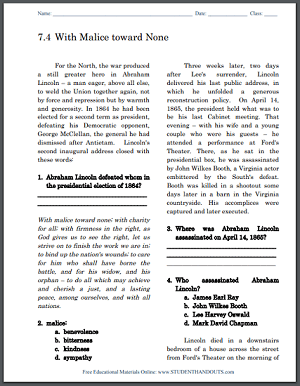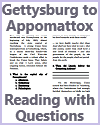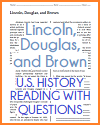| With Malice Toward None Reading with Questions |
|---|
| www.studenthandouts.com ↣ American History ↣ American History Readings with Questions |
|
For the North, the war produced a still greater hero in Abraham Lincoln—a man eager, above all else, to weld the Union together again, not by force and repression but by warmth and generosity. In 1864 he had been elected for a second term as president, defeating his Democratic opponent, George McClellan, the general he had dismissed after Antietam. Lincoln's second inaugural address closed with these words: 1. Abraham Lincoln defeated whom in the presidential election of 1864? With malice toward none; with charity for all; with firmness in the right, as God gives us to see the right, let us strive on to finish the work we are in; to bind up the nation's wounds; to care for him who shall have borne the battle, and for his widow, and his orphan—to do all which may achieve and cherish a just, and a lasting peace, among ourselves, and with all nations. 2. malice: a. benevolence b. bitterness c. kindness d. sympathy Three weeks later, two days after Lee's surrender, Lincoln delivered his last public address, in which he unfolded a generous reconstruction policy. On April 14, 1865, the president held what was to be his last Cabinet meeting. That evening—with his wife and a young couple who were his guests—he attended a performance at Ford's Theater. There, as he sat in the presidential box, he was assassinated by John Wilkes Booth, a Virginia actor embittered by the South's defeat. Booth was killed in a shootout some days later in a barn in the Virginia countryside. His accomplices were captured and later executed. 3. Where was Abraham Lincoln assassinated on April 14, 1865? 4. Who assassinated Abraham Lincoln? a. James Earl Ray b. John Wilkes Booth c. Lee Harvey Oswald d. Mark David Chapman Lincoln died in a downstairs bedroom of a house across the street from Ford's Theater on the morning of April 15. Poet James Russell Lowell wrote: Never before that startled April morning did such multitudes of men shed tears for the death of one they had never seen, as if with him a friendly presence had been taken from their lives, leaving them colder and darker. Never was funeral panegyric so eloquent as the silent look of sympathy which strangers exchanged when they met that day. Their common manhood had lost a kinsman. 5. When did Abraham Lincoln die? 6. panegyric: a. censure b. disapproval c. praising d. reprimand The first great task confronting the victorious North—now under the leadership of Lincoln's vice president, Andrew Johnson, a Southerner who remained loyal to the Union—was to determine the status of the states that had seceded. Lincoln had already set the stage. In his view, the people of the Southern states had never legally seceded; they had been misled by some disloyal citizens into a defiance of federal authority. And since the war was the act of individuals, the federal government would have to deal with these individuals and not with the states. Thus, in 1863 Lincoln proclaimed that if in any state 10 percent of the voters of record in 1860 would form a government loyal to the U.S. Constitution and would acknowledge obedience to the laws of the Congress and the proclamations of the president, he would recognize the government so created as the state's legal government. 7. Who became president of the U.S. following Lincoln's assassination? a. Andrew Johnson b. Jefferson Davis c. Ulysses S. Grant d. William McKinley 8. According to a proclamation made by Lincoln in 1863, what was required for the federal government to recognize the government of a formerly Confederate state? Congress rejected this plan. Many Republicans feared it would simply entrench former rebels in power; they challenged Lincoln's right to deal with the rebel states without consultation. Some members of Congress advocated severe punishment for all the seceded states; others simply felt the war would have been in vain if the old Southern establishment was restored to power. Yet even before the war was wholly over, new governments had been set up in Virginia, Tennessee, Arkansas, and Louisiana. 9. Why did members of Congress reject Lincoln's plan for readmitting rebellious states?  To deal with one of its major concerns—the condition of former slaves—Congress established the Freedmen's Bureau in March 1865 to act as guardian over African Americans and guide them toward self-support. And in December of that year, Congress ratified the 13th Amendment to the U.S. Constitution, which abolished slavery.
To deal with one of its major concerns—the condition of former slaves—Congress established the Freedmen's Bureau in March 1865 to act as guardian over African Americans and guide them toward self-support. And in December of that year, Congress ratified the 13th Amendment to the U.S. Constitution, which abolished slavery.10. What organization was created to help former slaves adjust to their new lives as free people? 11. What amendment to the U.S. Constitution abolished slavery? Throughout the summer of 1865 Johnson proceeded to carry out Lincoln's reconstruction program, with minor modifications. By presidential proclamation he appointed a governor for each of the former Confederate states and freely restored political rights to many Southerners through use of presidential pardons. In due time conventions were held in each of the former Confederate states to repeal the ordinances of secession, repudiate the war debt, and draft new state constitutions. Eventually a native Unionist became governor in each state with authority to convoke a convention of loyal voters. Johnson called upon each convention to invalidate the secession, abolish slavery, repudiate all debts that went to aid the Confederacy, and ratify the 13th Amendment. By the end of 1865, this process was completed, with a few exceptions. 12. Do you believe that Andrew Johnson should have punished the rebel states? Why or why not? Answer Key: 1. George McClellan; 2. B - bitterness; 3. Ford's Theater; 4. B - John Wilkes Booth; 5. April 15, 1865; 6. C - praising; 7. A - Andrew Johnson; 8. 10 percent of the voters of record in 1860 had to form a government loyal to the U.S. Constitution and acknowledge obedience to the laws of the Congress and the proclamations of the president; 9. Answers will vary, but may include: feared return of former rebels to positions of power; wanted to punish the Confederate states; 10. Freedmen's Bureau; 11. 13th Amendment; 12. Answers will vary. Click here to print this worksheet. |
 |  |  |  |  |  |
| www.studenthandouts.com ↣ American History ↣ American History Readings with Questions |














































